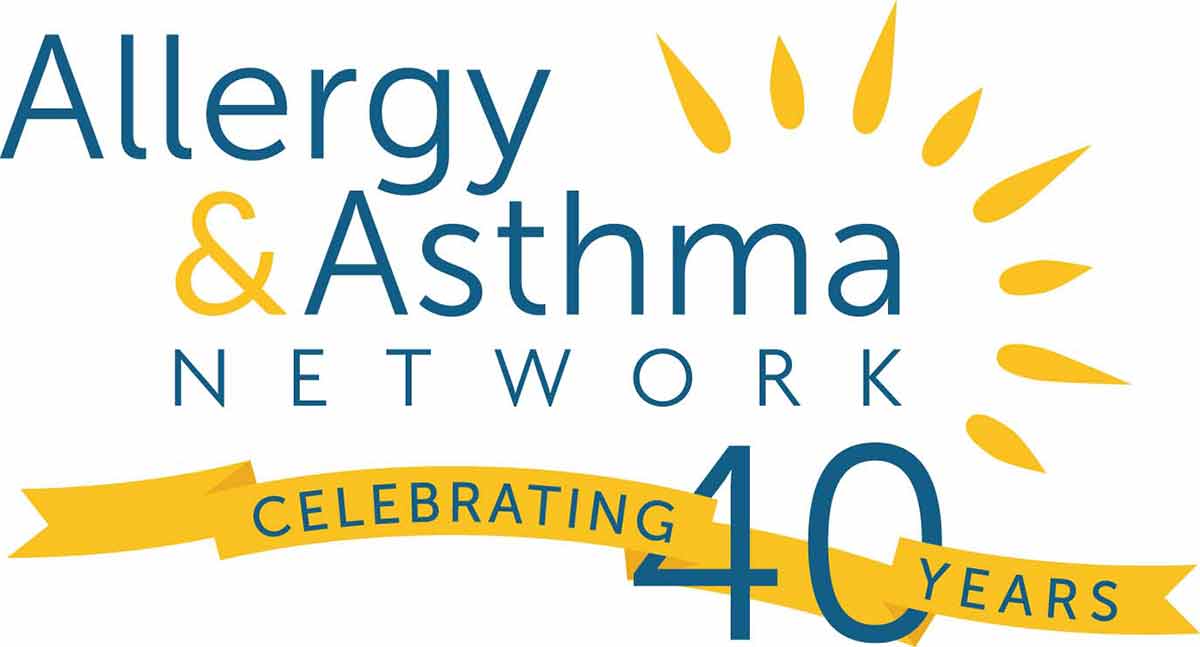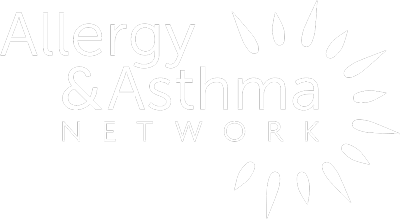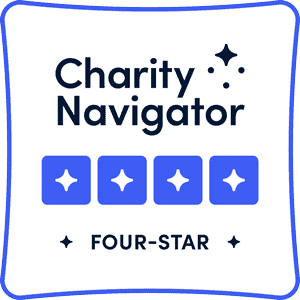Allergy & Asthma Network 40th Anniversary: A Legacy of Advocacy
Published: June 9, 2025 Revised: June 16th, 2025
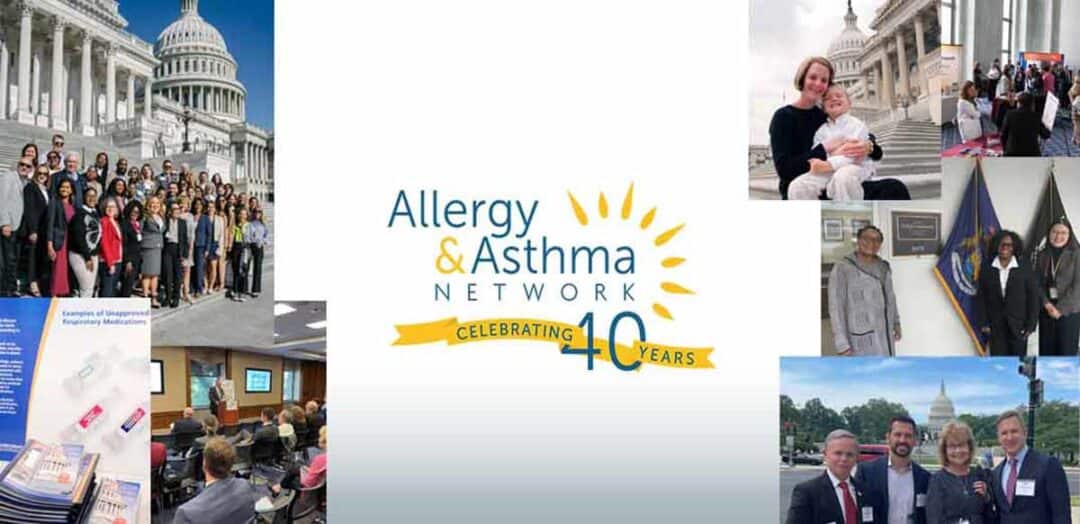
From its earliest days, Allergy & Asthma Network heard from patients and parents about their health concerns. Too often, their issues were not addressed by government leaders and the healthcare system.
They needed…
- access to safe, effective and affordable medications
- doctors who would listen and take time to explain how to manage their condition
- realistic and personal treatment plans
Advocacy quickly became a core mission area of the Network.
We began advocating for the rights of people with asthma and allergies. We were everywhere – our nation’s capital, in state houses across the country, and on the community level at churches and health fairs. We were in legislators’ offices in person and email inboxes with persuasive letters. We strived to serve as the patient voice – an objective that continues to this day.
Many challenges lie ahead. We are committed to keeping our community’s health concerns at the forefront of our advocacy priorities. We are dedicated to amplifying the patient voice.
In April 2025, Allergy & Asthma Network expressed deep concern over workforce reductions at the U.S. Centers for Disease Control and Prevention (CDC). This has led to the disbandment of the National Asthma Control Program (NACP). We have partnered with NACP since its inception in 1999, helping to equip patients and families with tools to manage asthma effectively. The program has been instrumental in reducing asthma hospitalizations and deaths. Restoring the NACP would help prevent critical gaps in asthma care and public health education.
This is one example of the many advocacy priorities we have undertaken in the last 40 years. Here’s a closer look at our commitment to advancing policies and programs that benefit the asthma and allergy community.
Making a Difference on Capitol Hill
Since 1998, Allergy & Asthma Network has hosted an annual advocacy day on Capitol Hill in Washington, DC. Allergy & Asthma Day Capitol Hill (AADCH) brings patients and families face-to-face with federal lawmakers to help drive meaningful change.
Our advocates share personal stories of living with asthma and allergies. They raise awareness of key issues impacting how they manage their condition. They urge support for critical healthcare legislation. And they mobilize action to bring about legislative victories.
As part of Allergy & Asthma Day Capitol Hill, Allergy & Asthma Network hosts a Congressional Lunch Briefing. Members of Congress from both sides of the aisle have attended the Briefing and offered remarks in support of our advocacy efforts.
“Asthma and allergies impact every family, not only here in America but around the world,” said former U.S. Rep. Fred Upton (R-MI) in 2021. “The work that you do at Allergy & Asthma Network is critical as we fight together to improve conditions for people living with asthma and allergies. I’ve got your back.”
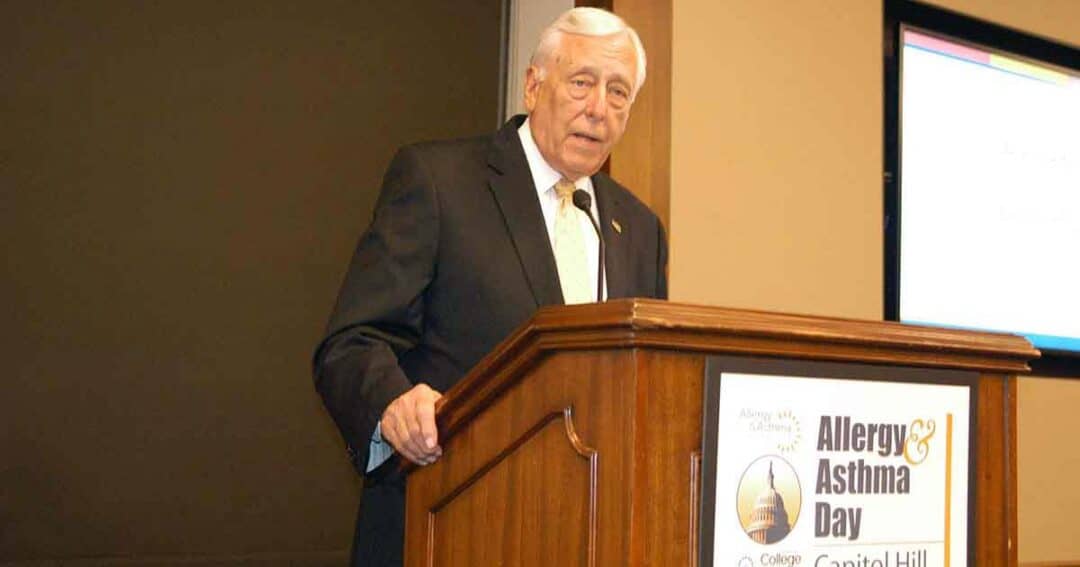
Added U.S. Rep. Steny Hoyer (D-MD), who has asthma and previously served as House Majority Leader in Congress, in 2020: “We need to hear those personal stories, your husband, your wife or your child, or somebody you know, of how asthma has impacted you. What you’re doing here is critical to passing legislation.
AADCH has played a key role in securing support for vital legislative, regulatory, and policy advancements. These efforts help safeguard the health and well-being of people living with asthma, allergies and related conditions.
In 2011, Allergy & Asthma Network co-founded the Congressional Asthma & Allergy Caucus. The Caucus is a bipartisan group within the U.S. House of Representatives. It’s dedicated to raising awareness of asthma and allergies in Congress. The Caucus supports research and advocates for policies that improve the lives of patients and families.
Many prominent members of Congress have served as Caucus co-chairs. The list includes former Reps. Eliot Engel, Carol Shea-Porter, and Bill Cassidy (now a U.S. Senator). The co-chairs for the 2025-26 Caucus are Debbie Dingell (D-MI) and David Valadao (R-CA).
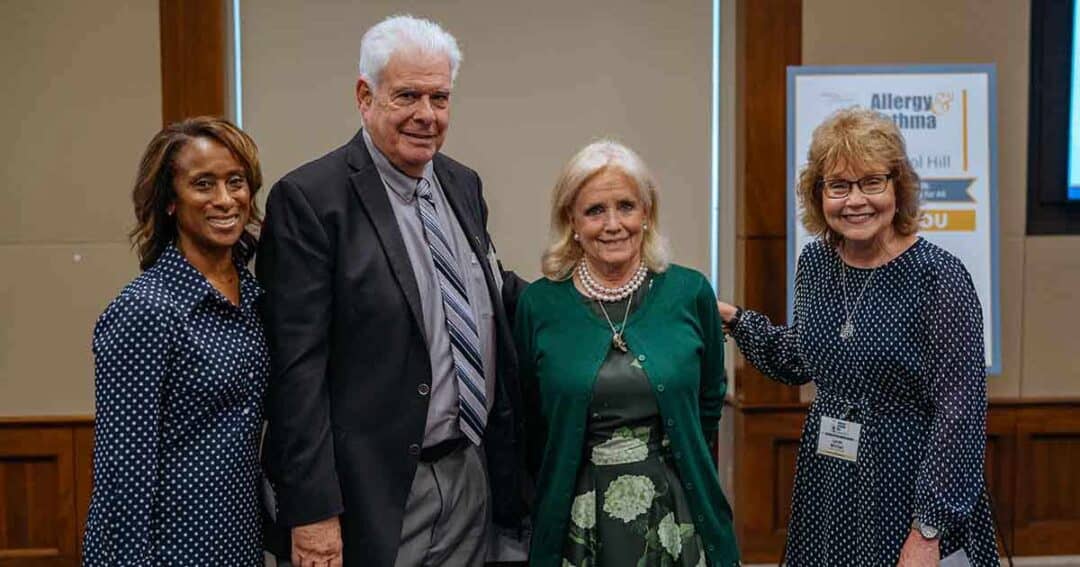
Speaking Up for Patients and Guidelines-Based Care
Soon after its founding, Allergy & Asthma Network quickly became sought-after for the patient voice in health policies. Government and industry came calling, seeking our expertise and perspective for patient-centered care.
We represented patients on the U.S. Food and Drug Administration (FDA) Consumer Advisory Council and Allergenic Products Committee and the National Institutes of Health’s National Allergy and Infectious Diseases Advisory Council.
In 1989, Allergy & Asthma Network founder Nancy Sander was invited to represent the patient perspective on the National Institutes of Health Coordinating Committee to publish the first-ever Guidelines for the Diagnosis and Management of Asthma. Our input ensured the Guidelines addressed patient needs.
And in 2008, Sander was part of the Coordinating Committee for first-ever food allergy guidelines: Guidelines for the Diagnosis and Management of Food Allergies in the U.S.

These Guidelines for asthma and food allergies remain essential resources for patients and health professionals alike. They set the standard of care – and Allergy & Asthma Network ensured that patients had a voice in what is best for their treatment.
Our efforts expand to regulatory agencies as well. When FDA considers issues involving asthma or allergy medications, we are ready with a balanced and researched response. Our patient surveys focus on what patients really want, and we present those results to FDA.
In 2004, the first asthma inhaler with an integrated dose counter reached the market. Allergy & Asthma Network encouraged all device manufacturers to include dose counters on all inhalers. This way patient would not have to guess how much medication is left in their inhaler. FDA agreed and published an industry directive. Today most – if not all – inhalers include dose counters.
In recent years, Allergy & Asthma Network played a key role in the passage of the Food Allergy Safety, Treatment, Education, and Research (FASTER) Act of 2021. The legislation adds sesame to the list of major U.S. food allergens to be identified on food labels.
Since passage of the FASTER Act, some food companies elected to add sesame to their food products and label it, instead of avoiding cross contact. Allergy & Asthma Network is working with other advocacy groups to raise awareness of this issue.
“I believe there will be a day when people say, ‘There once was a disease called asthma.’ And I believe there will be a day when a parent tells her child, ‘There once was a time when people actually died from eating peanut butter.’ I believe we will reach that day soon.”
– Former U.S. Rep. Carol Shea-Porter (D-NH), mother of two children with asthma
Medications at School and Student Self-Carry
Allergy & Asthma Network’s first major advocacy initiative spotlighted schoolchildren with asthma. They had a need for easy access to emergency medication – their asthma inhaler.
In 1987, we produced a video “Asthma & Allergies in the School: The Importance of Cooperative Care” that helped spark change. It led to school surveys, posters, countless speeches and congressional briefings. Momentum grew.
Congress passed the 2004 Asthmatic Schoolchildren’s Treatment and Health Management Act. Then-President George W. Bush signed it into law. Allergy & Asthma Network celebrated the 20th anniversary of this historic law in 2024.
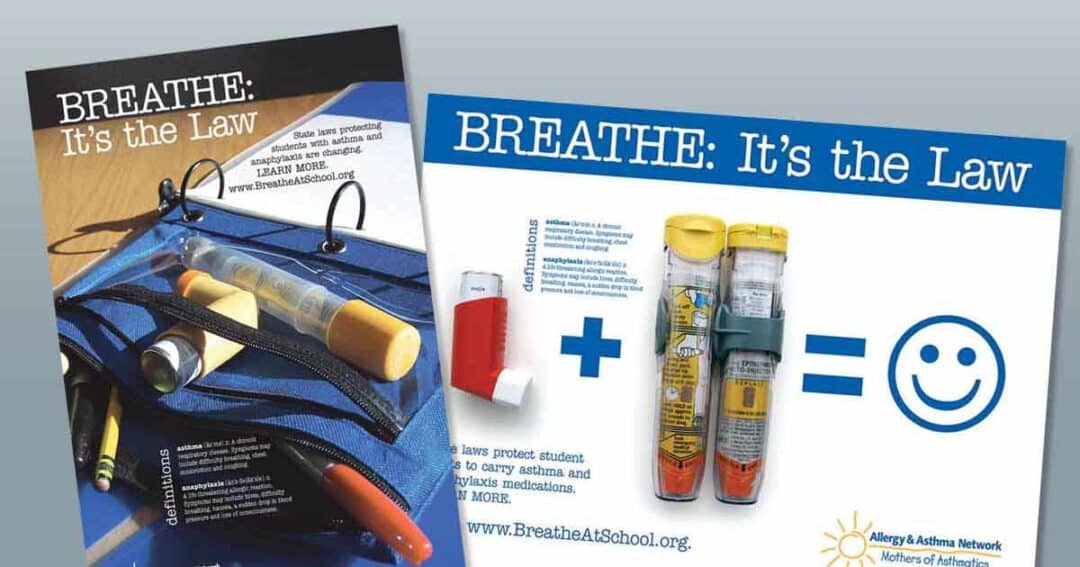
From there, our work turned to statesand patient education. A grassroots effort led to laws in all 50 states guaranteeing students the right to self-carry and use their lifesaving asthma medications. Meantime, 23 states have laws in place allowing schools to stock albuterol inhalers for asthma emergencies.
In 2013, the School Access to Emergency Epinephrine Act sparked another national movement. It allowed schools to stock epinephrine to treat anaphylaxis, a severe allergic reaction. All 50 states followed with laws of their own to ensure students have the right to self-carry their epinephrine at school.
Nearly all 50 states have school stock epinephrine laws in place. Now states are adjusting these laws to include different types of delivery systems. These include epinephrine inhalers and strips of film that contain the medication.
Allergies occur anywhere. That’s why stock epinephrine moved beyond school walls and to public venues. Many states passed entity laws that permit public venues to stock emergency epinephrine. The venues include restaurants, theme parks and sports venues.
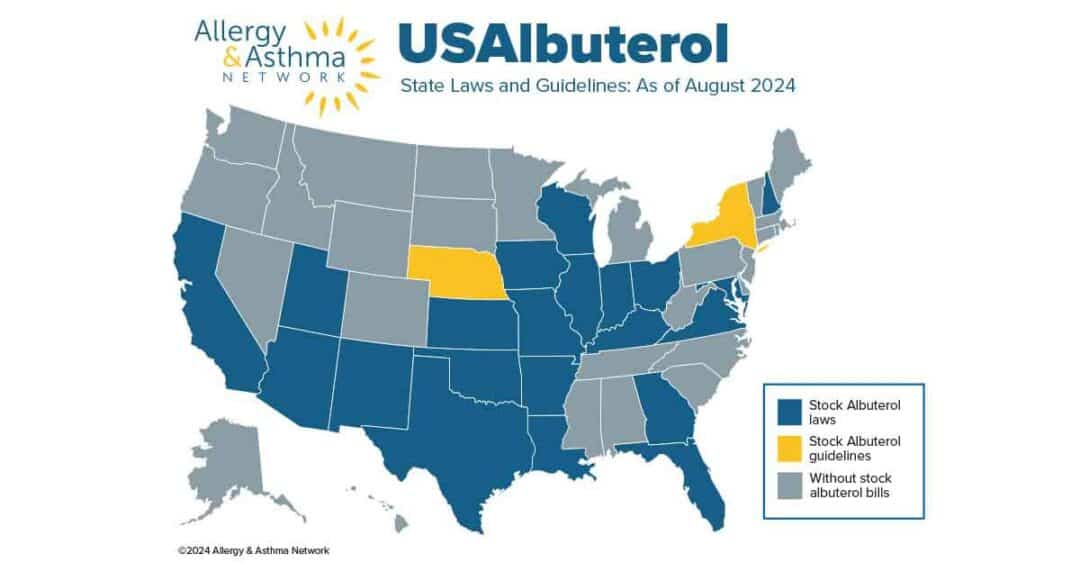
Medications at School Success Stories!
- One of our recent advocacy successes? We worked with lawmakers to develop and support the School-Based Allergies and Asthma Management Program Act. It was signed into law in 2021. The measure gives grants to states that implement asthma and allergy management programs in schools. It includes educating school staff on how to treat asthma and allergies in an emergency.
- Another success? We advocated on the state level to get Elijah’s Law enacted by five state legislatures so far. The measure ensures childcare facilities have policies in place to protect children with food allergies. It’s named after 3-year-old Elijah-Alavi Silvera, who died tragically in 2017 after an anaphylactic reaction at his daycare in New York City.
Expanding Access to Care
Too many people, especially those living in communities that are medically underserved, do not have access to quality care. They may face expensive medications and health insurance barriers. They may have obstacles getting to and from doctor offices. No one should be forced to choose between putting food on the dinner table and affording medical care.
Allergy & Asthma Network has worked with policymakers on legislation that improves access to affordable medications and treatments. This includes supporting Medicare, Medicaid, and laws that cap out-of-pocket costs for life-saving medications like asthma inhalers and epinephrine.
We advocate for fair insurance coverage, ensuring essential treatments are included in health plans. This has included availability of biologics and other advanced medications. It also includes the availability of generics and biosimilar medications.
Allergy & Asthma Network is a strong advocate for telehealth and its potential to improve access to care. We believe virtual care addresses unmet needs and health disparities. We actively lobby for policies that expand telehealth services.
Allergy & Asthma Network joined more than 400 organizations in urging Congress to make telehealth reforms permanent for Medicare beneficiaries. We also urged support for legislation to broaden telehealth coverage and include respiratory therapists as recognized providers.
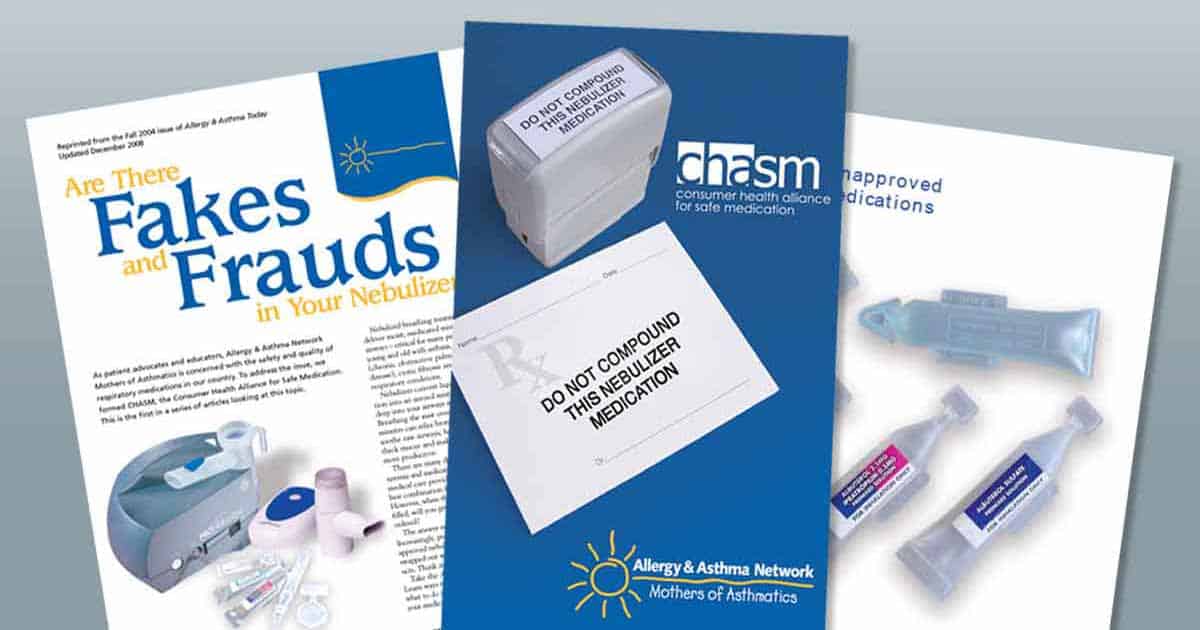
Access to Care Success Stories
- In 2006, a parent reported using a generic nebulizer medication for a brand that had no FDA-approved generic. It led to a Citizen’s Petition alerting FDA and HHS to possible fraud and the creation of the Consumer Health Alliance for Safe Medication (CHASM). CHASM was a group of stakeholders dedicated to exposing the widespread problem of nebulizer medications illegally manufactured under the guise of pharmacy compounding. Guilty parties were prosecuted, and the Centers for Medicare and Medicaid Services eliminated reimbursement for compounded nebulizer drugs.
- Allergy & Asthma Network has been a vocal advocate for protection against unexpected medical bills. In 2022, the “No Surprises Act” became law. It protects people from “surprise” medical bills and out-of-network cost sharing for emergency and supplemental care. Allergy & Asthma Network supports measures that enhance transparency and affordability in healthcare.
For 40 years, Allergy & Asthma Network has championed advocacy efforts to improve the lives of patients and families living with asthma and allergies. These efforts have raised awareness and led to impactful policies that protect the health and well-being of millions.
